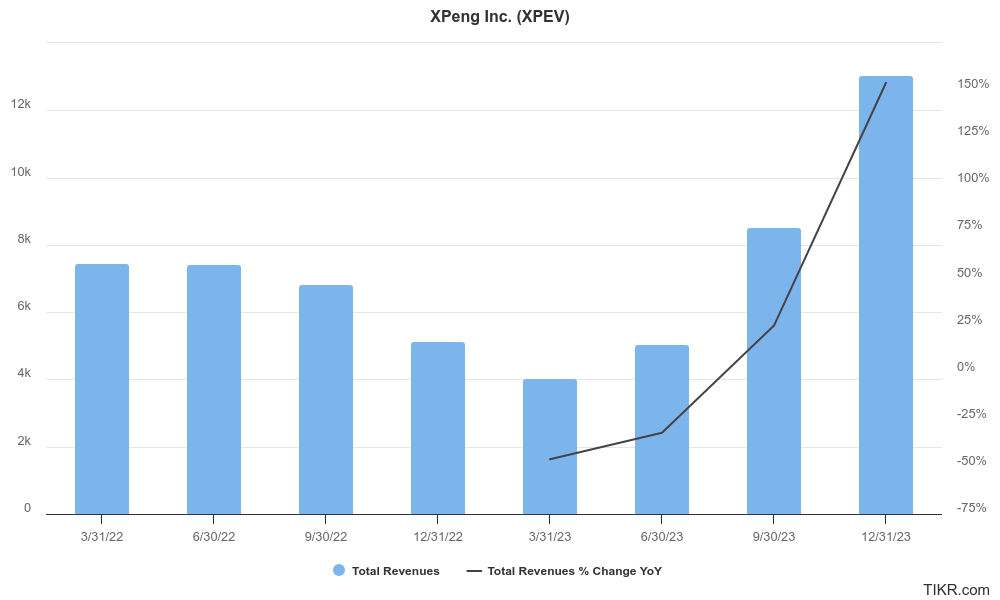Xpeng Motors Stock Surges as Q1 Earnings Beat Estimates
Please note that we are not authorised to provide any investment advice. The content on this page is for information purposes only.
Xpeng Motors (NYSE: XPEV) stock is trading higher in early US price action today after the company reported an impressive set of numbers for Q1. While its revenues were well ahead of estimates, the losses narrowed and were lower than feared.
Xpeng Motors reported revenues of RMB6.55 billion ($0.91 billion) in Q1 2024 which were 62.3% higher YoY and easily beat the RMB6.19 billion that analysts were expecting. The company’s vehicle margins improved to 5.5% as compared to 4.1% in Q4 2023 and -2.5% in Q1 2023.
Its consolidated gross margins meanwhile spiked to 12.9% which were over twice the 6.2% it reported in the previous quarter. The margin improvement and revenue beat were largely driven by the doubling of high-margin services revenues.
Xpeng Motors Reports Better Than Expected Q1 Earnings
Thanks to the improvement in gross margins, Xpeng Motors’ net loss narrowed to RMB1.37 billion (US$0.19 billion) in the first quarter of 2024. It posted a net loss of RMB2.34 billion in Q1 2023 and RMB1.35 billion in Q4 2023.
In his prepared remarks, Dr. Hongdi Brian Gu, Honorary Vice Chairman and Co-President said, “Despite fierce market competition, the Company’s gross profit margin saw a substantial increase to 12.9% in the first quarter of 2024.”
He added, “This signifies that XPENG, based on its smart EV business, has developed a unique approach to lift its profitability and international market potential by providing smart technologies.”
XPEV Has Partnered with Volkswagen
Last year, Volkswagen partnered with Xpeng Motors to build two EVs on its platform and also buy a stake in the company for a total consideration of $700 million. The deal was a pathbreaker for not only XPEV but also the Chinese EV ecosystem as it reflected the confidence of the German auto giant in a startup EV company. It was also a testimony to Xpeng Motor’s self-driving capabilities. The two companies are also exploring joint sourcing in order to cut down on costs.
Xpeng Motors is reaping the financial rewards from the partnership and in his prepared remarks CEO Xiaopeng He said, “Through our strategic partnership with the Volkswagen Group, XPENG is at the forefront of monetizing in-house developed smart technologies as a technology enabler. Our industry-leading technologies are expected to gain greater market influence and yield better financial returns.”
Xpeng Motors Expects Deliveries to Rise
Xpeng Motors’ core EV business meanwhile has sagged in 2024 and it delivered fewer than 10,000 cars in all four months this year. The company expects performance to improve in the coming months and forecast deliveries between 29,000 and 32,000 in Q2. While the run rate would still be less than what we saw towards the end of 2023, it still marks an improvement from the Q1 lows.
Autonomous Driving
In its earnings release, Xpeng said that yesterday it released its XOS 5.1.0 to users through an OTA (over the air) update. It said, “The XOS 5.1.0 integrated AI-powered smart cabin functions and XNGP ADAS technologies, including AI Valet Driver and XPlanner with neural network-based planning and control large model.”
Earlier this year, Xpeng Motors said that it had rolled out its XNGP driver assistance system to 243 cities a year ahead of schedule and plans to roll out the feature to Europe soon.
It is the first Chinese EV company to offer a mass-produced advanced driver assistance system for both highway and urban driving scenarios
Notably, Xpeng Motors has been advancing its autonomous driving capabilities and in August it also acquired the self-driving assets of Chinese ride-hailing app Didi. As part of the $744 million deal, Didi took a 3.25% stake in Xpeng in exchange for its EV and autonomous driving assets.
The autonomous driving industry in China could however see a shakeup as Tesla has received approval to launch its full self-driving (FSD) in China.
Xpeng Motors Expects to Deliver Flying Cars in 2026
Recently, Brian Gu, who is the co-president of Xpeng Motors told CNBC that Xpeng AeroHT which is an affiliate of XPEV, would start delivering flying cars to customers in 2026. Notably, flying cars were a hot investment theme a couple of years back. However, amid spiraling losses and tough capital market conditions, the sector fell out with investors.
A lot of startups in the flying car industry went public during the IPO boom of 2020-2021. However, after the initial euphoria, they now trade at a fraction of their listing prices. Even Uber sold its flying taxi unit to Joby Aviation and invested $75 million in the startup.
Gu meanwhile is bullish on the company’s flying car business and said that the company would start accepting pre-orders later this year.
EV Price War
The Chinese EV industry is currently witnessing an intense price war amid massive overcapacity and slowing growth. The EV war in China began in Q4 2022 when Tesla lowered car prices. The EV giant’s price cuts were followed by similar announcements from other carmakers including Xpeng Motors, Ford, Toyota, and Nissan.
Last year, even NIO lowered car prices. Previously the company had categorically said that it wouldn’t join the price war.
Wall Street analysts are getting cautious about Chinese EV stocks amid the intensifying price war and the feared slowdown in sales growth. Chinese EV stocks were mixed last year and while names like Li Auto and Xpeng Motors closed in the green last year, they fell sharply from their highs.
Xpeng Motors is also not immune from the price war and Third Bridge analyst Rosalie Chen said, “The launch of Xiaomi SU7 didn’t have a big impact on Xpeng. However, with the launch of SU8, it will have a big impact on Xpeng’s SUV series.”






